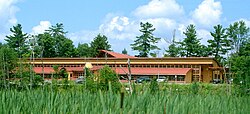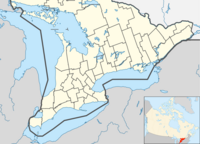Wahta Mohawk Territory, Ontario
| Wahta Mohawk Territory | |
|---|---|
| Indian reserve | |
| Wahta Mohawk Territory Indian Reserve | |
 |
|
| Coordinates: 45°01′N 79°44′W / 45.017°N 79.733°WCoordinates: 45°01′N 79°44′W / 45.017°N 79.733°W | |
| Country |
|
| Province |
|
| District municipality | Muskoka |
| First Nation | Wahta Mohawks |
| Area | |
| • Land | 61.17 km2 (23.62 sq mi) |
| Population (2011) | |
| • Total | Incompletely enumerated |
| Website | www.wahtamohawks.com |
The Wahta Mohawks are a Mohawk First Nation in Ontario. The Wahta Mohawk Territory is their territory (reserve) in the District Municipality of Muskoka, Ontario, Canada near Bala. It is bounded on the west by Highway 400, a major north-south artery in the province. About one-third of the citizens of Wahta Mohawk Territory live in the community of Wahta, along District Road 38, another third live within 100 km, and the remainder live elsewhere.
The land is made up of forest and lakes typical of the rugged Canadian Shield. It is used primarily for hunting and fishing by Mohawk from the reserves of Kanesatake and Kahnewake Quebec, who share access to this territory. It is the site of the Iroquois Cranberry Growers, which is Ontario's largest cranberry farm. Iroquois is owned and operated by the people of Wahta and welcomes visitors year-round. They offer tours during harvest and have a store open year-round.
Wahta Mohawk Territory was founded in 1881 after the Sulpician Order bought land here for Mohawk from the community of Kanesatake, Quebec, where there had been political and religious strife over land use rights. About one-fifth of the Mohawk from that community moved to the new area.
They also share the Indian River Indian Reserve with the Chippewas of Rama First Nation.
Due to a Mohawk land-claim dispute with the provincial government, the Wahta Territory, formerly known as the Gibson Reserve, prevented completion of a freeway through its land. Consequently, there was an eight-kilometre gap in Highway 400, where the roadway remained a two-lane highway for several years after construction of the freeway was completed further north.
...
Wikipedia

